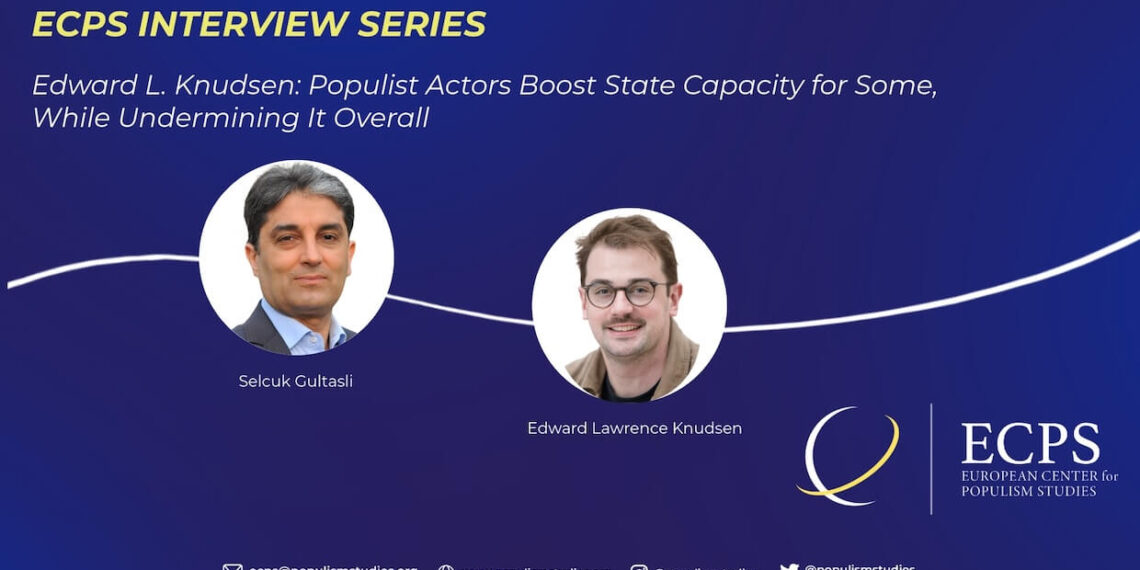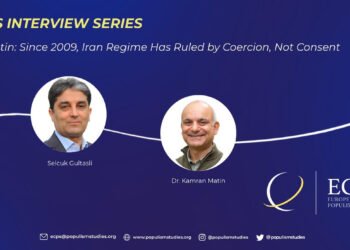Populist actors often present themselves as defenders of “the people” while strategically boosting state capacity for select groups and undermining it overall, argues Edward L. Knudsen, a doctoral researcher at the University of Oxford and Affiliate Policy Fellow at the Jacques Delors Centre. In an interview with ECPS, Knudsen explains how modern populists “selectively increase governance measures for specific populations while often undermining them in the aggregate,” creating new forms of exclusion and weakening accountability. He highlights fiscal control as the central battleground for populist movements and warns that if democratic actors fail to adapt to the rise of state capitalism, authoritarian forces may fill the void with illiberal governance models.
Interview by Selcuk Gultasli
In recent years, the resurgence of populist and authoritarian politics has profoundly reshaped the relationship between state capacity, democratic accountability, and public goods provision. To unpack these dynamics, the European Center for Populism Studies (ECPS) spoke with Edward Lawrence Knudsen, a doctoral researcher in international relations at the University of Oxford and an Affiliate Policy Fellow in European political economy at the Jacques Delors Centre in Berlin. Knudsen’s research, particularly through his work on the Berggruen Governance Index (BGI), offers a nuanced framework for understanding how governance quality interacts with populist and illiberal strategies in both established and emerging democracies.
Knudsen argues that modern populist and authoritarian actors are not merely dismantling governance structures but “selectively increase governance measures for specific populations while often undermining them in the aggregate.”Rather than speaking for the entire nation, these actors redefine “the people” as a narrower in-group, targeting state capacity and democratic accountability to benefit this constituency. “They argue that democratic accountability should serve this group, that state capacity should be strengthened in certain areas, and that public goods provision should focus on those regions or communities,” Knudsen explains. This selective strategy challenges national-level governance indices and highlights the need for more disaggregated analytical tools.
Drawing on his article “A Falling Star,” Knudsen underscores the mutually reinforcing decline of state capacity and democratic accountability in advanced democracies, particularly the United States. He identifies a “downward spiral” in which decades of underinvestment erode state capacity, fueling dissatisfaction and boosting the appeal of populist leaders. These leaders “capitalize on pre-existing governance weaknesses by offering simple answers,” but once in power, they “rarely improve state capacity and often end up pillaging or plundering the state, further weakening it and deepening the negative spiral.”
A central thread in the interview is Knudsen’s emphasis on the fiscal dimension as the primary target of populist capture. “There’s a reason that in every democratic revolution in history, going back to the French Revolution, the first thing you try to do is seize the treasury from the monarch,” he notes. Fiscal control—both taxation and expenditure—remains the core battleground for insurgent populist movements seeking to consolidate power.
Looking ahead, Knudsen identifies the rise of state capitalism as the defining political-economic trend of the coming decade. He warns that if democratic actors cling to outdated ideas of non-intervention, they risk leaving the field open to authoritarian forces willing to use state power for illiberal ends. “If the center is not willing to counter that with a form of democratic state capitalism, then that’s the real risk for the future in terms of a rising tide of authoritarianism globally.”
This wide-ranging conversation traces how governance weaknesses enable populist exploitation, how technocratic language can mask illiberal intentions, and how democracies might strategically adapt to an era of intensified state intervention.


